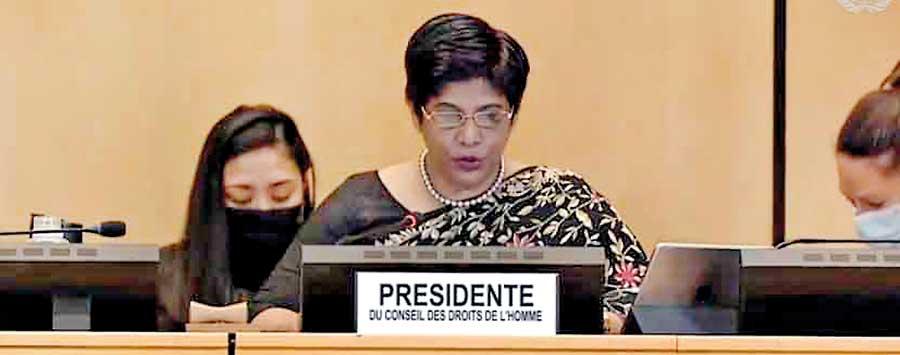Reply To:
Name - Reply Comment
Last Updated : 2024-04-16 18:03:00

UNHRC President Nazhat Shameem Khan of Fiji conducting the councils 46th sessions on Tuesday when the resolution on Sri Lanka was taken up for vote
 “Britain will not be able to have its own way in the UNHRC (United Nations Human Rights Council) as there are other influential countries such as Russia, China and Cuba at the UNHRC,” said the then Defence Secretary Gotabaya Rajapaksa in 2013. He was responding to the then British Prime Minister David Cameron’s March 2014 deadline for Sri Lanka to improve its human rights situation and the warning that Britain would have no choice but to move a resolution against Sri Lankan the following year at the UNHRC if Sri Lanka did not oblige.
“Britain will not be able to have its own way in the UNHRC (United Nations Human Rights Council) as there are other influential countries such as Russia, China and Cuba at the UNHRC,” said the then Defence Secretary Gotabaya Rajapaksa in 2013. He was responding to the then British Prime Minister David Cameron’s March 2014 deadline for Sri Lanka to improve its human rights situation and the warning that Britain would have no choice but to move a resolution against Sri Lankan the following year at the UNHRC if Sri Lanka did not oblige.
His comment came at a time when Sri Lanka was embroiled in what could be its worst foreign policy embarrassment while it was hosting the Commonwealth Heads of Government Meeting (CHOGM) in November 2013, with several countries deciding not to send heads of government to the meeting.
Gotabaya Rajapaksa, now the President of Sri Lanka, was in a way right. On Tuesday, at the UNHRC’s 46th sessions, big powers China and Russia, and Lanka’s all-weather friend Pakistan together with eight other nations defended the government when the council took up the resolution co-sponsored by Britain, Canada, Germany, Montenegro, North Macedonia and Malawi.
The manner in which member states exercised their vote on Tuesday once again proved that the UNHRC was politically charged.
If the United Nations Commission on Human Rights was dissolved, and, in its stead, the UNHRC was set up in 2006 was to depoliticize human rights, then the very purpose has been defeated. When it is politics which decides a member-state’s stance on a resolution, then the UNHRC is not morally equipped to deal with human rights violations. It needs urgent reforms aimed at depoliticizing the council to nullify allegations that it was -- as the previous US President Donald Trump’s administration called -- a ‘cesspool of political biases’.
But this does not mean the UNHRC should be wound up and states should be allowed to go unpunished for violating human rights. Part of these reforms should include educating and empowering people on human rights. People should be made aware that every democracy worth its salt is duty bound to uphold human rights. No nation can call itself a member of the community of civilized nations and at the same time violate human rights with impunity.
Human rights do not belong to the state; it belongs to people while the state remains the custodian of human rights. If a state fails in its human rights duty, democracy demands that there should be a domestic mechanism for redress through the judiciary.
If there is a serious erosion of the independence of the judiciary and if judges, cowing down to political pressure, fail to deliver pro-human rights judgments, then the state becomes a failed state. Such a situation allows other countries to intervene in a target nation under the guise of the doctrine of Responsibility to Protect.
States should not only promote human rights but seen to be promoting human rights by strengthening mechanisms to help aggrieved citizens to find redress. The previous Sri Lankan government was somewhat doing exactly that with its ‘good governance’ charade. Britain recently escaped International Criminal Court prosecution because the ICC prosecutors concluded that it was satisfied with Britain’s domestic mechanism to address human rights violations.
 "Human rights do not belong to the state; it belongs to people while the state remains the custodian of human rights. If a state fails in its human rights duty, democracy demands that there should be a domestic mechanism for redress through the judiciary."
"Human rights do not belong to the state; it belongs to people while the state remains the custodian of human rights. If a state fails in its human rights duty, democracy demands that there should be a domestic mechanism for redress through the judiciary."
However, civilization has not reached the advanced level required for nations to defend human rights devoid of politics. Just as courts are expected to dispense justice impartially and apolitically, international bodies dealing with human rights should also act in a similar manner. When a nation is accused of committing human rights and other nations are asked to be jurors in the UNHRC, the juror nations are expected to vote not on the basis of their feuds or strategic, political, economic or cultural relations with the accused nation. They should be true to their conscience that they are acting in the interest of human rights. But in reality, every nation’s vote on Tuesday was connected with its national interest or local political exigencies.
Take, for instance, India. During the UNHRC vote on the Sri Lanka resolution, its abstention largely reflected the ruling Bharatiya Janatha Party’s efforts to become a political force in the southern Tamil Nadu state which goes to the state assembly polls on April 6, with the UNHRC vote being a hot political issue. To some degree, India’s abstention can also be seen as a retaliatory measure for Sri Lanka’s decision to renege on an agreement with regard to the Colombo Port’s East Container Terminal and also due to Colombo’s tilt towards China at the expense of India.
India also abstained from the vote on the resolution targeting Israel. India was once a champion of Palestinian freedom struggle. On Tuesday, India abandoned the Palestinians, one of the most oppressed people in the world. But India had no qualms in binning human rights in favour of its ally Israel with whom it is maintaining strong defence and intelligence ties.
Then take Malawi, one of the sponsors of the resolution on Sri Lanka -- just as Argentina was when the South American nation presented a resolution against Sri Lanka at the UN Commission on Human Rights in the 1980s. Malawi has its own problems with human rights. According to the 2018 United States State Department report, Malawi’s human rights issues included extrajudicial killings; torture; arbitrary detention; harsh and life threatening prison and detention centre conditions; criminal libel; corruption; and lack of investigation. The report says though in some cases the government took steps to prosecute officials who committed abuses, impunity remained a problem.
A resource rich, poor country, Malawi depends on foreign aid and much of it is coming from the UK, Canada and Germany – the nations that sponsored the UNHRC resolution on Sri Lanka. During the 2013 controversy ridden Commonwealth Summit in Colombo, Malawi joined Canada, Mauritius, India and other nations that sent lower level representation in what was seen as a protest against Sri Lanka’s alleged human rights violations. To assume that Malawi’s ‘yes’ vote for the resolution on Sri Lanka stemmed from its commitment to human rights is an insult to intelligence. The country simply followed instructions from its donor nations, just as it became a sycophant of apartheid South Africa in the past.
Besides politics, nations also talk big about human rights in an effort to increase their soft power or to provide a fig leaf to cover their own human rights shame.
Tuesday’s vote also exposed Sri Lanka’s foreign policy defects, many of which have been caused by politics. The government’s politically driven stubbornness with regard to Muslims’ demand that they be allowed to bury Covid victims cost it the votes of Bahrain and Indonesia, which once strongly backed Sri Lanka.
Also when SAARC member Nepal abstained from voting, there is something seriously wrong with our diplomacy. If the country had exercised a balanced foreign policy and exercised prudence, especially with regard to India and the Islamic nations, there would have been a better face-saving option.
It is not too late to learn lessons from mistakes.
Nandasena Gopallawa Friday, 26 March 2021 09:34 PM
Send the Generals to the School of Political Science in Timbukto and return with a basic degree on Fishing!!!

Add comment
Comments will be edited (grammar, spelling and slang) and authorized at the discretion of Daily Mirror online. The website also has the right not to publish selected comments.
Reply To:
Name - Reply Comment
On March 26, a couple arriving from Thailand was arrested with 88 live animal
According to villagers from Naula-Moragolla out of 105 families 80 can afford
Is the situation in Sri Lanka so grim that locals harbour hope that they coul
A recent post on social media revealed that three purple-faced langurs near t
09 Apr 2024 - 1 - 1173

10 Apr 2024
09 Apr 2024